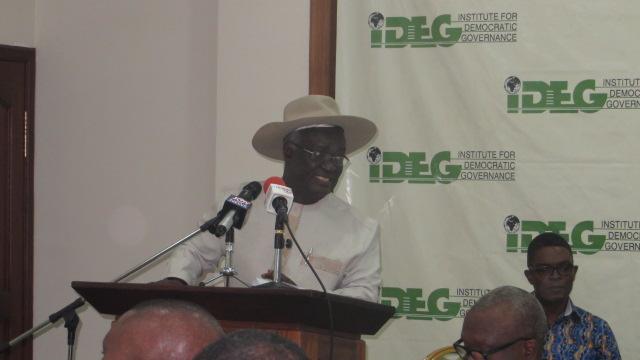Prof Ahwoi outlines 30 projections for local governance

Professor Kwamena Ahwoi, a former Minister of Local Government and Rural Development, has outlined 30 projections for the Local Governance system in Ghana within the next 30 years.
He proposed that there should be a cap placed on the number of districts to be created to reduce cost such as administrative, infrastructure, bureaucracies and technocracies.
He said the Inter-Ministerial Coordinating Committee (IMCC) on Local Governance Decentralisation must remain the key national institutional mechanism responsible for the inter-sectoral coordination of decentralisation.
Prof Ahwoi gave these recommendations in his presentation at the Institute of Democratic Governance (IDEG) Roundtable on the topic; “Three Decades of Local Governance in Ghana: Retrospect and Prospects”.
The Roundtable was organised by IDEG to reflect on Ghana’s Local Governance Decentralisation process over the last 30 years; identify the challenges and the achievements and the way forward.
Prof Ahwoi, who is the longest serving Local Government and Rural Development Minister, and under whose tenure the concept of District Assemblies Decentralisation started, proposed that the metropolitan, municipal and district assemblies (MMDAs) system must be made partisan with a percentage being appointed by the chiefs and traditional authorities.
He noted that the sub-district structures such as unit committees and sub-urban councils must be strengthened and made more functional.
Prof Ahwoi, who is also a Member of the Centre for Democratic Transition and an Adjunct Professor of Law at the Ghana Institute of Management and Public Administration (GIMPA) Law School, suggested that departments of all sectors must be decentralised except Foreign Affairs, Defence, Justice and the Interior.
He said staff of MMDAs must be “hired and fired” at the MMDA level; adding that the inter-service/inter-sectoral collaboration and cooperation provisions of Act 936 must be fully implemented.
He said there must be checks and balances at the district level, which would be operating effectively with the Commission on Human Rights and Administrative Justice, the National Commission on Civic Education and the Economic and Organised Crime Office in all districts.
He recommended that the Institute of Local Government Studies be made fully in charge of local government capacity-building and training; adding that uniform standards set for all services delivered by MMDAs must be complied with.
Prof Ahwoi said the Long-Term National Development Plan should be implemented and the role of the MMDAs in it should be clearly spelt out.
He said the public private partnership should become fully operational at the district level and all streets in Ghana be named and with property having addresses.
He said MMDAs should be fully in charge of spatial planning and the spatial planning regulations must be complied with.
More juicy, elastic and easy-to-collect taxes should be assigned to the MMDAs as internally generated funds.
Prof Ahwoi said the fiscal decentralisation principle of “finances follow functions” should be fully operationalised under the composite budget system.
He said the recommendations of the Inter-Governmental Fiscal Framework/Inter-Governmental Fiscal Transfers must be fully implemented and the District Assemblies Common Fund should be consolidated.
Performance-Based Grant System must be a permanent feature on the local government scene and regulations must be enacted to support Act 936.
Processes for civil society organisations and popular participation in the enactment of by-laws and the passing of fee-fixing resolutions must spelt out and CSOs Liaison Desk should be established in every MMDA, Prof. Ahwoi said.
He said there should be a line in every MMDA budget dedicated to the interface between MMDAs and CSOs and that chiefs, women and the youth must be given the opportunity to play a more prominent role in MMDAs.
Prof Awhoi said political parties must be allowed to sponsor candidates to MMDA and Unit Committee elections and prepare district-specific manifestoes for district level elections.
Residents of the districts should look to MMDAs and MMDCEs for development projects and service delivery, he said.
Source: GNA
